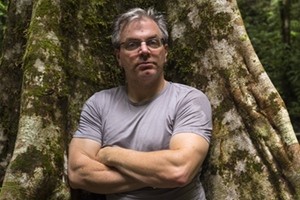 In college Robb Hill combined journalism, art, and anthropology classes to create his degree in Documentary Photography. Then he worked at a small paper while saving money to move to Budapest, Hungary. Based in Budapest, he worked on stories from the Balkans for American magazines, newspapers, and NGOs.
In college Robb Hill combined journalism, art, and anthropology classes to create his degree in Documentary Photography. Then he worked at a small paper while saving money to move to Budapest, Hungary. Based in Budapest, he worked on stories from the Balkans for American magazines, newspapers, and NGOs.
In 2000, Robb returned to the U.S. and worked with CITY 2000, on a year-long project documenting Chicago. For the next eight years Robb shot for editorial assignments and commercial work.
After meeting a priest in the Back of the Yards neighborhood in Chicago’s Southside, Robb also produced a project about at-risk kids. He was drawn to the school that the priest founded, Second Chance. Over the next four years Robb documented one class as they wrestled with the delayed benefits of education versus the instant gratification of life on the street. This project was awarded grants from the Illinois Arts Council, the Puffin Foundation, and the Chicago Arts Council.
In 2008 Robb moved to Washington D.C. where he now covers politics and regional issues for major news organizations.
Over the years, Robb regularly returned home to Utica, Indiana, to photograph a project on the transformation of the rural area where he grew up. He captured the rolling hills and fields as they turned into concrete and steel for the Lewis and Clark Bridge and highway construction project over the Ohio River.
Robb Hill also teaches workshops and classes at Photoworks in Glen Echo. He combines landscape and documentary traditions, and challenges the student as a photographer to make a series of photographs with an emotional narrative at its core. He wants the student to expand their notion of landscape photography.
Robb asks students to consider two soul-searching questions: “Who am I in this landscape?” and “Why is it important to me?” These questions are answered by photographing emotively, editing rationally, and developing a method of storytelling Robb calls creative nonfiction.
Through discussion, individual and group critiques, and examining the best work from both photographic traditions, Robb helps his students push past the literal to photograph with instinct and an educated eye. He also works with them to develop a post-processing method that supports their personal visions.
